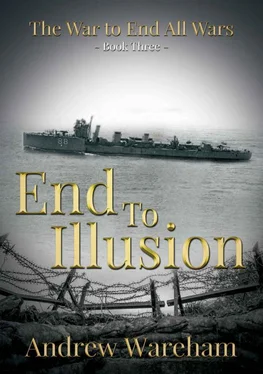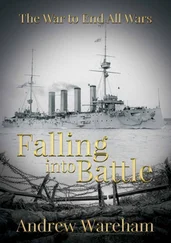“They might hit the troopers, Adams.”
“So they might. There’s a chance that we could destroy them in return. We have more troopships than they have submarines.”
“Don’t like it… I think you might be right. Can we do it?”
Christopher laughed and elaborately shook his head.
“No! Nay! Never! Not a chance! The Admiral in his wisdom has decreed that we shall patrol to seek out and destroy submarines. Such being the case, the correct policy, indeed the only possibility, is to follow his orders. There is no choice. We cannot tell an admiral in all his glory that he is mistaken – admirals do make mistakes but being wrong is not one of them. We are to patrol, even though patrolling is showing itself futile. If the orders are as yet providing no success, then we must ask ourselves how and why we are not applying them correctly. Let us be clear, Ephraim, it is not the orders at fault, it is ourselves for not following them properly.”
The first Lieutenant showed himself less than amused, the more so when he realised that Christopher was more than half serious.
“I thought the Navy was the leader of the nautical world, Adams, on top of everything!”
“The Navy thinks the same, old chap. To an extent it is – the biggest and in some ways the best. Unfortunately, it’s sixty years since we had a war, and that not very big, a century since last our wooden walls ruled the globe and defeated Napoleon. The Navy has become stale, hidebound and incapable of thinking for itself. The great bulk of our admirals don’t think for themselves at all – they have no need to, everything that can be discovered about war at sea is already known. They have to keep up the tradition. They are not in the business of doing anything new. Submarines exist, but they are unfair and should not therefore be encouraged. I have actually heard that said, by the way. Almost unbelievable.”
“What else is new to them, Adams?”
“The torpedo, which they have, mostly, come to accept as a legitimate weapon of war. The aeroplane, which they believe is a toy. You know, Ephraim, it is possible that before this war is over there will be planes carrying a ton of bombs. What would happen if, say, a great flotilla of them, five or six together, flew over a battleship?”
It was an appalling prospect.
“Could that happen?”
“Why not? There was a seaplane flew over Connaught only last month, up in the Adriatic, not so far from Split. It could do nothing other than observe – dropped a pair of tiny grenades and missed the bridge, did no harm at all. But it might have hit. Had there been several of them, quite a chance they could have killed the officer of the watch, possibly caused the ship to run off course and ground itself. Tell that to an admiral!”
“Until it happens, they will not believe it. Then they will not do very much about it.”
“Exactly. I would bet that you will not see special high angle guns to defend against aeroplanes this year.”
“And we will not see ships with hydrophones sailing with every convoy for a long time yet… Do all merchant ships sail in convoy, by the way?”
“No. Troopers commonly do, in case of German raiders, but the bulk of freighters sail on their own.”
“Even less chance of protecting them, in that case.”
“The Admiral will tell you that our patrols are protection enough. If they all cluster in convoys, they make big targets. If instead you have fifty ships sailing separately, what is the chance that they will be caught and sunk?”
“Isn’t that a good argument?”
“Might be! Who knows? Too complicated for us – mere lieutenants and commanders and such low objects hear and obey. End of story!”
“That, gentlemen, was a bloody disaster!”
The battalion had indulged itself in a day of field manoeuvres, marching some five miles from the barracks onto sandy heathlands and there forming line and advancing, shoulder to shoulder, in the approved fashion. The morning had gone well. The afternoon had seen them in companies, practicing for the war of movement that would come when the trenchline was breached.
The officers, most of whom had never been out in the wilds on their own before, had taken their compasses in hand and led their companies and platoons off to locate and occupy designated points. Once arrived, they were to report to the waiting observers and then march off again to the main road and the rendezvous before returning to barracks for the evening meal at six o’clock. The last platoon had come in at midnight, by lorry, having been found valiantly marching westwards behind their second lieutenant, away from the barracks and some twenty miles distant. Had it not been for a telephone call from a local police station they might have been halfway to Wales by dawn.
“There will be lessons in map-reading, gentlemen. The use of the compass will be taught, rather than guessed at. The art of finding one’s way in alien terrain is to be mastered!”
Few of the officers would meet Richard’s eye. One young gentleman did so happily.
“Permission to speak, sir?”
“Yes, Mr Openshaw. Briefly.”
“Signposts, sir. Do they have them in Belgium?”
“They do, Mr Openshaw. It is always possible to read them. Do remember that they, for some reason best known to themselves, use the kilometre.”
“Yes, sir. Divide by eight and multiply by five, sir.”
“Do what?”
“Eight kilometres amounts to five miles, sir.”
“Right. Thank you for that piece of information, Mr Openshaw. It does make life easier knowing that. I suggest you all note that quick conversion, gentlemen.”
Richard was inclined to give Openshaw a little leeway. His F Company had reached its target and had returned to barracks in good time, due, Captain Peters had admitted, solely to Openshaw’s ability to use map and compass.
“He was a Boy Scout, sir. Learned outdoor pursuits with them. Very keen on his scouting, sir.”
“How pleasing. The British Army having to rely on little boys in funny hats to find its way about the country! I suggest you organise lessons for all of the other subalterns, Captain Peters. No doubt Openshaw can set them into little patrols to assist their learning process.”
Richard was displeased with the quality of his officers mess – too many new and young and wholly untrained. He had too few experienced officers to show the new men the right way to do things in the Army, and had, he admitted privately, too little knowledge himself to offer the guidance that was needed. He went to Colonel Braithwaite for assistance.
“We need experience, sir. Can we borrow a pair of dugouts from Depot, perhaps? Two old captains who have thirty years each of peacetime service can at least teach the youngsters the basics of how to be an officer. I can pull them into shape for the trenches. I don’t know enough of the basics of running a company and performing the routines of army life.”
“Not to worry, Baker! I shall put it in hand this day. Should have thought of it myself, a good idea. Take some use from the old farts wandering the Depot and looking for something to do. The basic routines of military existence are all most of them know – ideal for setting the boys on the right track.”
Captains Plowright and Anderton appeared within the day, lent by the Second Battalion with its colonel’s extreme goodwill.
“Couldn’t believe my luck, old chap, when you told me you actually wanted a pair of doddering old blowhards to teach your greenhorns the basics of military life. Can’t get more basic than those two! They know the fundamental rules of the Army – ‘if it moves, salute it; if it’s stationary, whitewash it.’ They’ll teach your new hands, privates and second lieutenants alike. Fill them with gin every evening and they’ll be refuelled and good as new next morning.”
Читать дальше












